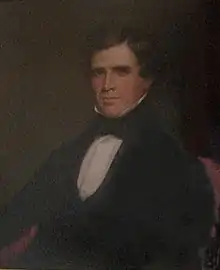Charles Paine
Charles Paine (April 15, 1799 – July 6, 1853) was an American Whig politician, woolen mill owner, merchant, railroad builder, and the fifteenth Governor of Vermont.
Charles Paine | |
|---|---|
 Official Vermont State House portrait | |
| 15th Governor of Vermont | |
| In office October 15, 1841 – October 13, 1843 | |
| Lieutenant | Waitstill R. Ranney |
| Preceded by | Silas H. Jennison |
| Succeeded by | John Mattocks |
| Member of the Vermont House of Representatives | |
| In office 1828–1830 | |
| Preceded by | John Starkweather |
| Succeeded by | Lebbeus Bennett |
| Personal details | |
| Born | April 15, 1799 Williamstown, Vermont |
| Died | July 6, 1853 (aged 54) Waco, Texas |
| Resting place | Elmwood Cemetery, Northfield, Vermont |
| Political party | Whig |
| Domestic partner | Lorinda Stevens |
| Children | 2 |
| Alma mater | Harvard College |
| Profession | Businessman |
Biography
Paine was the son of Elijah Paine and Sarah (Porter) Paine, and was born in Williamstown, Vermont. He graduated from Harvard University in 1820,[1][2] and became active in several business ventures. Though he never married, he had two children.[3]
Career
Paine moved to Northfield, Vermont in the early part of the nineteenth century to run the family woolen mill. He operated this business until it was destroyed by fire in 1848. He had various other business interests including a hotel and a store, but he is most often remembered as the individual who brought railroads to Vermont. He founded the Vermont Central Railroad and served as the first president of the company.[4]
In Northfield, Paine held the offices of Town Selectman and Moderator of the Town Meeting. In his political life he was a member of the Vermont House of Representatives from 1828 through 1829. He was the 15th Governor of Vermont from 1841 until 1843. During his tenure, a stricter accounting of public funds was established.[5]
As the founder and president of the Vermont Central Railroad Paine built its headquarters in his home town of Northfield, despite the hilly terrain, earning the enmity of residents of larger, more accessible nearby towns. In the extensive yard, engines and railroad cars were built and repaired.[6] In 1853 the Vermont Central Railroad went into bankruptcy due to overexpansion and, in some cases, mismanagement. The railroad was placed under receivership and renamed the Central Vermont Railroad. Its headquarters were moved to St. Albans.
Death
Paine died in Waco, Texas after three weeks of dysentery while helping the Southern Pacific Railroad choose a route. He is interred at Elmwood Cemetery, Northfield, Washington County, Vermont.[7] The home of the former governor, 75 South Main Street, Northfield, Vermont, is where the Northfield Historical Society is housed, connected to the Brown Public Library of the town.[8]
References
- Porcellian Club of Harvard University (1857). Catalogue of the Porcellian Club of Harvard University. Cambridge, MA: Allen and Farnham. p. 32.
- Harvard University (1900). Quinquennial Catalogue of the Officers and Graduates of Harvard University. Cambridge, MA: John Wilson and Son. p. 144.
- "Charles Paine". National Governors Association. Retrieved October 31, 2012.
- "Charles Paine". National Governors Association. Retrieved October 31, 2012.
- "Charles Paine". National Governors Association. Retrieved October 31, 2012.
- "Charles Paine". Central Vermont Chamber of Commerce. Retrieved October 31, 2012.
- "Charles Paine". The Political Graveyard. Retrieved October 31, 2012.
- "Charles Paine". Northfield Historical Society. Retrieved October 31, 2012.
Further reading
- New England Puritan (published in Boston), Thursday, August 4, 1853
External links
- The Political Graveyard
- Central Vermont Chamber of Commerce
- National Governors Association
- Charles Paine at Find a Grave
- Northfield Historical Society
| Party political offices | ||
|---|---|---|
| Preceded by Silas H. Jennison |
Whig nominee for Governor of Vermont 1841, 1842 |
Succeeded by John Mattocks |
| Political offices | ||
| Preceded by Silas H. Jennison |
Governor of Vermont 1841-1843 |
Succeeded by John Mattocks |
